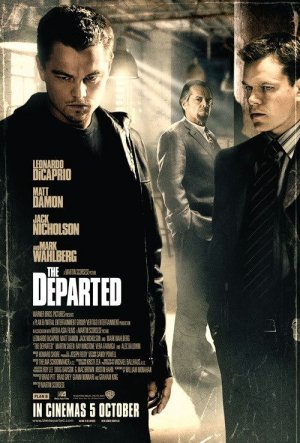|
The
Departed
Forget about Gangs of New York and spare me all
talk of The Aviator.
It always felt wrong to watch Martin Scorsese’s yearly
vie for a gold statuette.
Ordinarily,
remakes of Hong Kong films don’t sit right with me.
Oh the irony, that studios look East when seeking “something
new” for audiences to cut their teeth on only to ruin
them with sad and tired Western tropes in the process of
pillaging…er, adapting. So why does Scorsese get a
free pass when remaking Wai Keung Lau and Siu Fai Mak’s
Infernal Affairs?
Simply
put, Infernal Affairs was a troubled effort with
one thing in its corner – an excellent idea built
upon the ground laid by Scorsese himself. The notion of
corruption and covert dances between police and gangsters
is titillating, but the original film crumbles under the
weight of its own premise. However, Scorsese’s film
works.
Screenwriter
William Monahan transplants Infernal Affairs from
Hong Kong to the streets of Boston, and infuses it with
a sense of regional edge. The film still centers around
two police cadets who embark on very different paths, yet
Monahan’s approach to these intertwined characters
crackles with Mamet-speak and Scorsese’s direction
– a comfortable step forward on the foundation laid
by the director’s dalliances in Italian mafia films.
The
key for any Scorsese fan is the use of some of the director's
more notable thematic elements, many of which are present
even if to a lesser extent than perhaps desired. Leonardo
DiCaprio’s Billy Costigan battles familial duty while
straddling class lines, while Matt Damon’s Colin Sullivan
is haunted by his own sense of morality and faith.
Religious
imagery stalks Colin as he moves from a former altar boy
to a member of Frank Costello’s (Jack Nicholson) fold.
Abandoning aspirations of a life of the cloth, Colin enlists
in the police force and quickly excels through the academy
under Frank’s tutelage. He makes plainclothes directly
out of the academy, and is quickly assigned to a special
crimes task force unit. Frank provided Colin with guidance
and in return he has a man on the inside of the police department
– not a bad commodity to have when you are the kingpin
of an Irish gang.
Billy,
on the other hand, has only ever wanted to do right, but
has felt compelled to maintain a tough guy image when being
passed back and forth between parents who live on opposite
ends of the class spectrum. Life has continually beaten
him, his family and most of the people around him, into
the ground. We watch him uncomfortably tell off his uncle
while his dying mother succumbs to her illness in a hospital
bed.
He grew
up in a family rooted in crime, and his dreams to become
a police detective are stymied because of it. Instead he
is offered the opportunity of a turncoat. He would be failed
out of the academy and sent off into the streets where he
will be picked up for a small crime large enough to land
him a respectable amount of time in jail. Once out, he is
charged with one mission – infiltrate Costello’s
gang and report back from the inside.
Scorsese’s
version of the tale is far less convoluted than the original,
but what he adds are layers that enhance the tone and theme
of the power struggle at hand. The Departed is
not simply about two men forced to go against the grain
of who they believed themselves to be, it’s also about
two men caught up in the pretense of duty and the imposed
expectations from society.
To delve
too deep would do a disservice to the plot, although it
can be said that the ensemble cast excels and Monahan’s
dialogue pops. The third act problems from the original
are resolved and the film moves at a pace that does not
necessarily surpass, but builds off Scorsese’s previous
work.
Rating:

|








